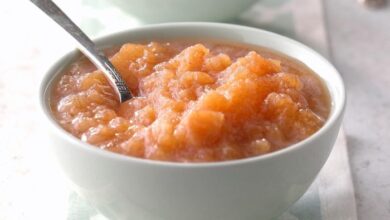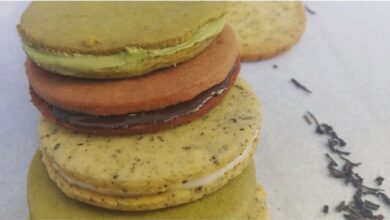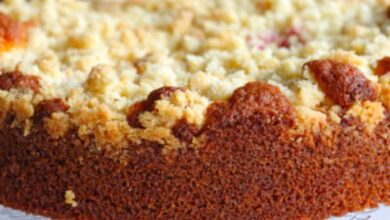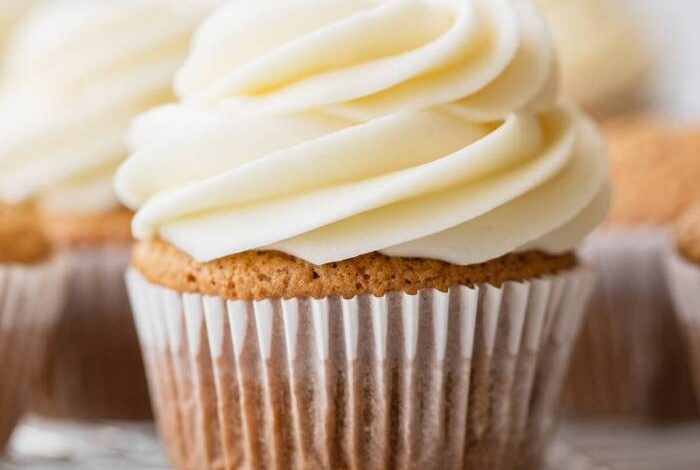
Basic Cream Cheese Frosting: A Delicious Guide
Basic cream cheese frosting is a classic dessert topping that adds a touch of sweetness and tang to any baked good. This versatile frosting is perfect for cakes, cupcakes, cheesecakes, and even cookies. The secret to its creamy texture and irresistible flavor lies in the simple combination of cream cheese, butter, powdered sugar, and vanilla extract.
Cream cheese frosting has a rich history, dating back to the early 20th century. Its popularity has only grown since then, with countless variations and adaptations created by home bakers and professional chefs alike. Whether you prefer a classic vanilla frosting or a more adventurous flavor like lemon or chocolate, cream cheese frosting offers endless possibilities for culinary creativity.
Basic Cream Cheese Frosting
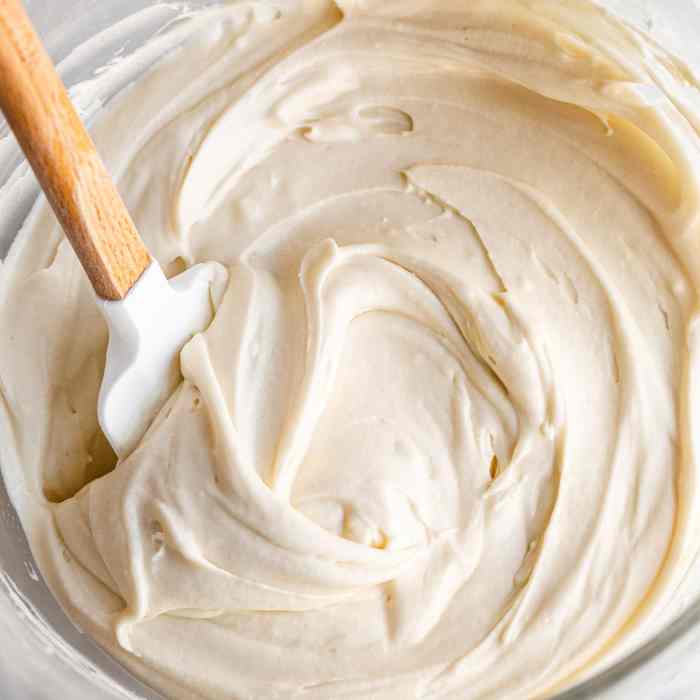
Basic cream cheese frosting is a versatile and beloved topping for cakes, cupcakes, and other desserts. It’s known for its smooth, creamy texture and subtly tangy flavor. This frosting is typically made with cream cheese, butter, powdered sugar, and vanilla extract.
Each ingredient plays a crucial role in achieving the desired texture and flavor.
The Ingredients and Their Roles
The primary ingredients of basic cream cheese frosting are:
- Cream Cheese:This provides the frosting’s signature tangy flavor and rich, creamy texture. It’s important to use full-fat cream cheese for the best results, as low-fat versions can be too thin and watery.
- Butter:Butter adds richness and smoothness to the frosting. It also helps to stabilize the texture and prevent the frosting from becoming too runny.
- Powdered Sugar:This provides the sweetness and helps to create a smooth, lump-free consistency. Using powdered sugar instead of granulated sugar is essential, as it dissolves more easily and creates a smoother texture.
- Vanilla Extract:This adds a warm, fragrant flavor that complements the cream cheese and butter. Pure vanilla extract is recommended for the best flavor.
Origins of Cream Cheese Frosting
The exact origins of cream cheese frosting are uncertain, but it’s believed to have emerged in the early 20th century. The popularity of cream cheese as a spread and its ability to create a smooth, creamy frosting likely contributed to its widespread adoption.
Ingredients and Variations
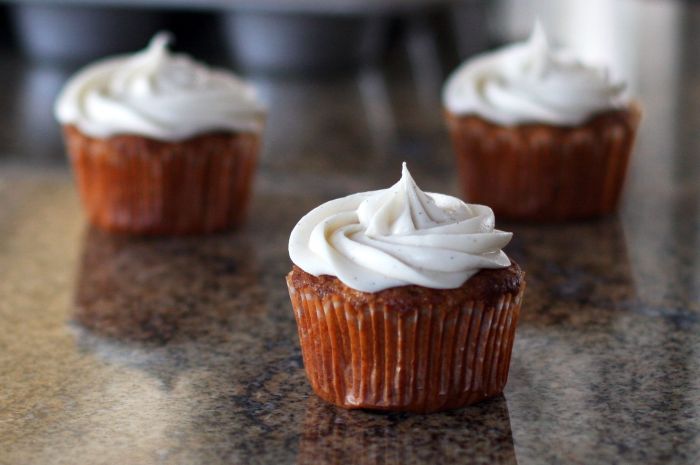
Basic cream cheese frosting is a versatile and delicious topping for cakes, cupcakes, and other desserts. It’s known for its smooth, creamy texture and rich flavor. Let’s delve into the essential ingredients and explore some popular variations that will elevate your frosting game.
Ingredient Breakdown
The basic cream cheese frosting recipe consists of a few key ingredients that work together to create its signature texture and taste.
| Ingredient | Quantity | Purpose | Variations |
|---|---|---|---|
| Cream Cheese | 8 ounces | Provides the creamy base and tangy flavor | Full-fat cream cheese is recommended for the best texture and flavor. Reduced-fat options can be used, but the frosting may be slightly thinner. |
| Butter | 1/2 cup (1 stick) | Adds richness and helps to create a smooth consistency | Unsalted butter is preferred for better control over the sweetness of the frosting. Salted butter can be used, but you may need to adjust the sugar accordingly. |
| Powdered Sugar | 3 cups | Sweetens the frosting and adds volume | Adjust the amount of powdered sugar to achieve your desired level of sweetness. |
| Vanilla Extract | 1 teaspoon | Enhances the flavor and adds a warm, sweet aroma | Experiment with different extracts, such as almond, lemon, or peppermint, to create unique flavor profiles. |
Flavor Variations
Basic cream cheese frosting can be transformed into a variety of delicious flavors by incorporating different ingredients. Here are some popular variations:* Chocolate Cream Cheese Frosting:Add 1/2 cup of melted unsweetened chocolate to the frosting for a rich, decadent flavor.
Lemon Cream Cheese Frosting
Basic cream cheese frosting is a classic for a reason – it’s incredibly versatile and always a crowd-pleaser. Whether you’re topping cupcakes, decorating a cake, or simply spreading it on a slice of bread, it’s a simple yet satisfying treat.
And speaking of simple yet satisfying, you should check out this recipe for creamy make ahead mashed potatoes – it’s the perfect side dish for any occasion. But back to frosting, the key to a good cream cheese frosting is using high-quality cream cheese and letting it soften completely before beating it with butter and powdered sugar.
Trust me, the result is worth the extra effort!
Add 1 tablespoon of lemon zest and 1/4 cup of lemon juice for a bright, citrusy flavor.
Almond Cream Cheese Frosting
Add 1 teaspoon of almond extract for a subtle nutty flavor.
Coffee Cream Cheese Frosting
Add 1 tablespoon of instant coffee powder for a bold, coffee-flavored frosting.
Basic cream cheese frosting is a classic for a reason – it’s smooth, tangy, and incredibly versatile. You can use it on everything from cupcakes to brownies, and it’s even delicious on its own! If you’re looking for a little inspiration, try adding a touch of sweetness and a hint of spice to your next batch of frosting by incorporating some of the techniques from this recipe for cream corn like no other.
The subtle sweetness and spice would pair beautifully with the tangy cream cheese.
Strawberry Cream Cheese Frosting
Fold in 1 cup of fresh or frozen strawberries for a sweet and tangy flavor.
Cream Cheese: The Key to Texture
Cream cheese plays a crucial role in achieving the desired consistency and texture of the frosting. It’s the foundation that creates a smooth, spreadable, and luxurious texture. The fat content in cream cheese helps to create a rich and creamy base that holds its shape well.
A basic cream cheese frosting is a classic for a reason – it’s simple, versatile, and always a crowd-pleaser. I love using it on a variety of baked goods, but it’s especially delicious on top of these easy cranberry orange muffins.
The tangy cream cheese frosting cuts through the sweetness of the muffins, creating a perfectly balanced flavor combination.
When whipped with butter and powdered sugar, it creates a light and airy frosting that is perfect for decorating cakes and cupcakes.
Preparation and Techniques
Making cream cheese frosting is a straightforward process, but a few techniques are crucial for achieving the perfect consistency and flavor. The right tools and mixing methods are essential for creating a smooth, spreadable frosting that will enhance your baked goods.
Mixing Techniques
The mixing technique plays a significant role in the texture and consistency of the frosting. It is important to use a stand mixer or hand mixer to ensure the ingredients are thoroughly combined and the frosting is smooth.
- Stand Mixer:A stand mixer is ideal for larger batches of frosting and for achieving a perfectly smooth and airy texture. The stand mixer’s powerful motor allows for efficient mixing and prevents overworking the frosting.
- Hand Mixer:A hand mixer is a suitable option for smaller batches or if you prefer a more hands-on approach. It is important to use a low speed at first and gradually increase the speed as the ingredients combine.
Achieving the Right Consistency
The consistency of the frosting is essential for its ability to spread and hold its shape. Here’s how to achieve the desired texture:
- Creaming the Butter and Cream Cheese:Start by creaming the butter and cream cheese together until light and fluffy. This step incorporates air into the frosting, resulting in a lighter and fluffier texture.
- Adding Powdered Sugar Gradually:Add the powdered sugar gradually, scraping down the sides of the bowl as you mix. This ensures that the sugar is evenly distributed and prevents the frosting from becoming too thick or lumpy.
- Adjusting the Consistency:If the frosting is too thick, add a tablespoon of milk or cream at a time until it reaches the desired consistency. If the frosting is too thin, add more powdered sugar, a tablespoon at a time, until it thickens.
Application and Uses
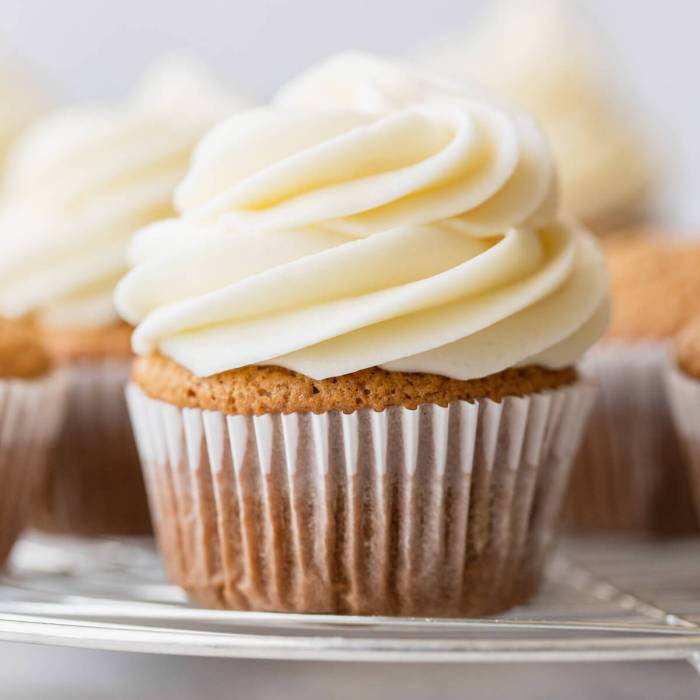
Basic cream cheese frosting is a versatile and beloved topping that can elevate countless desserts. Its smooth texture, tangy flavor, and ability to hold its shape make it an ideal choice for a wide range of applications.
Common Applications of Basic Cream Cheese Frosting
The following table Artikels some of the most common applications of basic cream cheese frosting, showcasing its adaptability across various dessert types.
| Dessert | Application Method | Frosting Variation | Example |
|---|---|---|---|
| Cakes | Spread over cooled cake layers | Vanilla cream cheese frosting | Vanilla cake with vanilla cream cheese frosting |
| Cupcakes | Piped onto cooled cupcakes | Chocolate cream cheese frosting | Chocolate cupcakes with chocolate cream cheese frosting |
| Cheesecakes | Spread over a cooled cheesecake base | Classic cream cheese frosting | New York-style cheesecake with classic cream cheese frosting |
| Brownies | Spread over cooled brownies | Coffee cream cheese frosting | Fudge brownies with coffee cream cheese frosting |
Versatility of Basic Cream Cheese Frosting
Basic cream cheese frosting’s versatility extends beyond its application to cakes, cupcakes, and cheesecakes. Its adaptability allows for a wide range of creative uses. For instance, it can be used as a filling for pastries, such as croissants or cinnamon rolls, or as a topping for cookies, fruit tarts, or even ice cream.
The smooth and creamy texture of the frosting complements various dessert flavors and textures, enhancing the overall taste and presentation.
Decorative Elements, Basic cream cheese frosting
Basic cream cheese frosting can be further enhanced with decorative elements, adding visual appeal and personalization. Sprinkles, edible flowers, chocolate shavings, or even crushed nuts can be incorporated into the frosting to create unique designs and textures. These additions can complement the frosting’s flavor or provide a contrasting element, creating a visually stunning and delicious dessert.
Storage and Preservation
Proper storage is crucial for maintaining the quality and freshness of your basic cream cheese frosting. This will help prevent spoilage and ensure your frosting remains delicious and spreadable for a longer period.
Storage Conditions
Storing basic cream cheese frosting correctly is vital to prevent it from becoming grainy, separating, or developing an off-flavor. Here are the recommended storage conditions:
- Temperature:Store your frosting in the refrigerator at a temperature between 35°F and 40°F (2°C and 4°C). This temperature range helps to inhibit the growth of bacteria and maintain the frosting’s texture.
- Container:An airtight container is essential for storing cream cheese frosting. This will prevent it from drying out and absorbing flavors from other foods in the refrigerator. Use a container made of glass, plastic, or stainless steel that is specifically designed for food storage.
Shelf Life
The shelf life of basic cream cheese frosting can vary depending on the ingredients used and the storage conditions. However, it is generally safe to store basic cream cheese frosting in the refrigerator for up to 5 days.
“If you plan to use the frosting within 24 hours, you can store it at room temperature.”
For longer storage, consider freezing the frosting. It can be frozen for up to 2 months. However, freezing may slightly alter the texture of the frosting.

